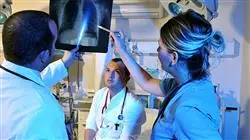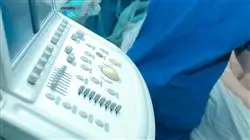University certificate
The world's largest faculty of medicine”
Introduction to the Program
Scientific evidence increases the quality of medical care. Staying up-to-date is key to providing better care for patients in life-threatening emergencies due to major trauma in the intensive care unit"

Cardiorespiratory arrest of origin is one of the leading causes of death in the Western world, and there is sufficient evidence to demonstrate that early recognition of the situation, activation and appropriate response of emergency systems, and early initiation of CPR maneuvers and defibrillation can reduce mortality and its sequelae. In the case of the intensive care unit, the rapid care procedure is not very different, although sufficient human and technological resources are available to improve the patient's prognosis significantly.
The survival of hemodynamically unstable patients depends to a great extent on the response of the professionals who attend and manage them in the critical care units, with the use of appropriate technology and scientific evidence in the establishment of therapeutic procedures.
This Postgraduate diploma is designed to facilitate the updating of diagnostic and therapeutic procedures in the specialist in the critical patient, in order to know the advances in Advanced Life Support and to be able to improve decision making, thus increasing life expectancy and patient prognosis.
New scenarios in intensive care medicine push us to propose new training programs that meet the real needs of experienced professionals, so that they can incorporate advances in patient life support"
The Postgraduate diploma in Advanced Cardiovascular Support in Intensive Care Medicine contains the most complete and updated scientific program on the market. The most important features of the program include:
- Contains Clinical cases presented by experts. The graphic, schematic, and eminently practical contents with which they are created provide scientific and practical information on the disciplines that are essential for professional practice
- New diagnostic and therapeutic developments in the care of the hemodynamically unstable patient
- Presentation of practical workshops on procedures, diagnostic and therapeutic techniques in Life Support
- Video lessons on differentpathologies and how to approach them
- Algorithm-based interactive learning system for decision-making in the presented clinical situations
- Theoretical lessons, questions to the expert, debate forums on controversial topics, and individual reflection assignments
- Content that is accessible from any fixed or portable device with an Internet connection
This Postgraduate diploma may be the best investment you can make in the selection of a refresher program for two reasons: in addition to updating your knowledge in Advanced Cardiovascular Support in Intensive Care Medicine, you will obtain a Postgraduate diploma from TECH Global University"
Its teaching staff includes specialists of recognized prestige in emergencies and emergencies, who bring the experience of their work to this training.
The multimedia content developed with the latest educational technology will provide the physician with situated and contextual learning, i.e., a simulated environment that will provide immersive training programmed to train in real situations.
This program is designed around Problem Based Learning, whereby the physician must try to solve the different professional practice situations that arise during the course. For this purpose, the physician will be assisted by an innovative interactive video system developed by renowned experts in the field of emergency medicine with extensive teaching experience.
Increase your decision-making confidence by updating your knowledge with this Postgraduate diploma course"

Do not miss the opportunity to update your knowledge in Advanced Cardiovascular Support in Intensive Care Medicine to increase the quality of your patient care"
Why study at TECH?
TECH is the world’s largest online university. With an impressive catalog of more than 14,000 university programs available in 11 languages, it is positioned as a leader in employability, with a 99% job placement rate. In addition, it relies on an enormous faculty of more than 6,000 professors of the highest international renown.

Study at the world's largest online university and guarantee your professional success. The future starts at TECH”
The world’s best online university according to FORBES
The prestigious Forbes magazine, specialized in business and finance, has highlighted TECH as “the world's best online university” This is what they have recently stated in an article in their digital edition in which they echo the success story of this institution, “thanks to the academic offer it provides, the selection of its teaching staff, and an innovative learning method aimed at educating the professionals of the future”
A revolutionary study method, a cutting-edge faculty and a practical focus: the key to TECH's success.
The most complete study plans on the university scene
TECH offers the most complete study plans on the university scene, with syllabuses that cover fundamental concepts and, at the same time, the main scientific advances in their specific scientific areas. In addition, these programs are continuously being updated to guarantee students the academic vanguard and the most in-demand professional skills. In this way, the university's qualifications provide its graduates with a significant advantage to propel their careers to success.
TECH offers the most comprehensive and intensive study plans on the current university scene.
A world-class teaching staff
TECH's teaching staff is made up of more than 6,000 professors with the highest international recognition. Professors, researchers and top executives of multinational companies, including Isaiah Covington, performance coach of the Boston Celtics; Magda Romanska, principal investigator at Harvard MetaLAB; Ignacio Wistumba, chairman of the department of translational molecular pathology at MD Anderson Cancer Center; and D.W. Pine, creative director of TIME magazine, among others.
Internationally renowned experts, specialized in different branches of Health, Technology, Communication and Business, form part of the TECH faculty.
A unique learning method
TECH is the first university to use Relearning in all its programs. It is the best online learning methodology, accredited with international teaching quality certifications, provided by prestigious educational agencies. In addition, this disruptive educational model is complemented with the “Case Method”, thereby setting up a unique online teaching strategy. Innovative teaching resources are also implemented, including detailed videos, infographics and interactive summaries.
TECH combines Relearning and the Case Method in all its university programs to guarantee excellent theoretical and practical learning, studying whenever and wherever you want.
The world's largest online university
TECH is the world’s largest online university. We are the largest educational institution, with the best and widest online educational catalog, one hundred percent online and covering the vast majority of areas of knowledge. We offer a large selection of our own degrees and accredited online undergraduate and postgraduate degrees. In total, more than 14,000 university degrees, in eleven different languages, make us the largest educational largest in the world.
TECH has the world's most extensive catalog of academic and official programs, available in more than 11 languages.
Google Premier Partner
The American technology giant has awarded TECH the Google Google Premier Partner badge. This award, which is only available to 3% of the world's companies, highlights the efficient, flexible and tailored experience that this university provides to students. The recognition as a Google Premier Partner not only accredits the maximum rigor, performance and investment in TECH's digital infrastructures, but also places this university as one of the world's leading technology companies.
Google has positioned TECH in the top 3% of the world's most important technology companies by awarding it its Google Premier Partner badge.
The official online university of the NBA
TECH is the official online university of the NBA. Thanks to our agreement with the biggest league in basketball, we offer our students exclusive university programs, as well as a wide variety of educational resources focused on the business of the league and other areas of the sports industry. Each program is made up of a uniquely designed syllabus and features exceptional guest hosts: professionals with a distinguished sports background who will offer their expertise on the most relevant topics.
TECH has been selected by the NBA, the world's top basketball league, as its official online university.
The top-rated university by its students
Students have positioned TECH as the world's top-rated university on the main review websites, with a highest rating of 4.9 out of 5, obtained from more than 1,000 reviews. These results consolidate TECH as the benchmark university institution at an international level, reflecting the excellence and positive impact of its educational model.” reflecting the excellence and positive impact of its educational model.”
TECH is the world’s top-rated university by its students.
Leaders in employability
TECH has managed to become the leading university in employability. 99% of its students obtain jobs in the academic field they have studied, within one year of completing any of the university's programs. A similar number achieve immediate career enhancement. All this thanks to a study methodology that bases its effectiveness on the acquisition of practical skills, which are absolutely necessary for professional development.
99% of TECH graduates find a job within a year of completing their studies.
Postgraduate Diploma in Advanced Cardiovascular Support in Intensive Care Medicine
Advanced cardiovascular support in intensive care medicine is a medical technique used to treat critically ill patients with heart disease and other pathologies affecting the circulatory system. This procedure is used in intensive care units and may include administering medications, monitoring vital signs, using life support devices such as mechanical ventilator and performing invasive procedures such as central catheter placement or endotracheal intubation.
Advanced cardiovascular support technique includes administering medications to improve heart contractility, reduce vascular resistance and improve blood flow. Ventricular assist devices, such as circulatory assist devices, and extracorporeal membrane oxygenation (ECMO) may also be used.
Advanced cardiovascular support is a highly complex procedure and requires a highly trained medical team specialized in the treatment of pathologies of the cardiovascular system. Advanced cardiovascular support is a vital technique in intensive care units to save the lives of patients with acute pathologies affecting the circulatory system.
This online educational program seeks to provide students with comprehensive education on advanced cardiovascular support in intensive care medicine and focuses on providing advanced training in the management of critically ill patients with cardiovascular disease in the intensive care setting. This program is designed to develop advanced skills and knowledge in the diagnosis and treatment of cardiovascular disease, and in the advanced management of life support.
Our goal is to give healthcare professionals advanced education in the management of critically ill patients with cardiovascular disease in the intensive care setting. Upon completion of this program, healthcare professionals will be able to provide advanced and appropriate treatment for the management of critically ill patients with cardiovascular disease. This education will improve the quality of care and outcomes of critically ill patients in the hospital setting.







